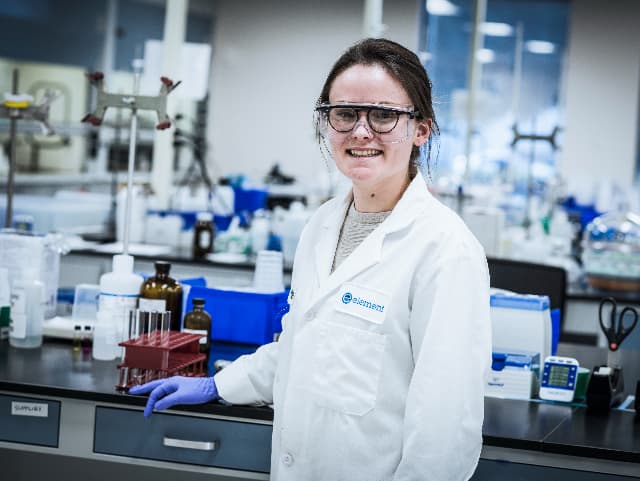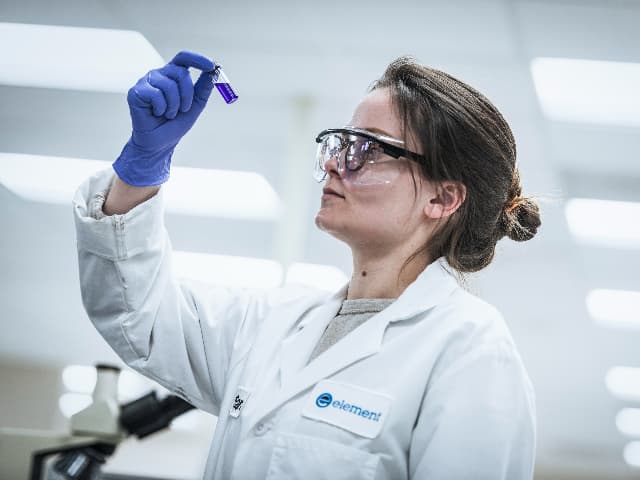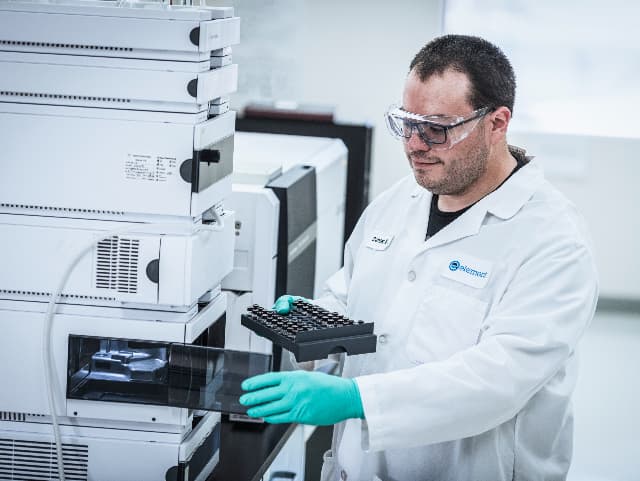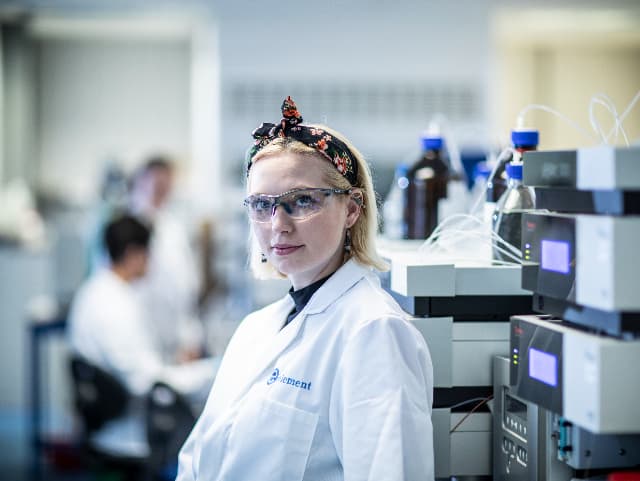Compendial Monograph and Pharmacopeial Testing
Meet global regulatory requirements and accelerate your pharmaceutical products' path to market through comprehensive compendial testing across multiple pharmacopeias (USP/NF, EP, BP, JP). Our FDA-registered facilities provide cGMP-compliant testing from raw materials through finished products, ensuring seamless manufacturing release while maintaining the highest quality standards for your drug development needs.

What is Compendial Monograph and Pharmacopeial Testing at Element?
Compendial testing verifies that pharmaceutical products meet standardized specifications detailed in pharmacopeial compendia - a fundamental requirement for global manufacturing release and distribution. At Element, we provide comprehensive testing programs meeting USP/NF, EP, BP, and JP specifications in our FDA-registered facilities, supporting everything from raw materials to finished products under cGMP standards that comply with 21 CFR 210 and 211.

What Can Element Offer You For Compendial Monograph and Pharmacopeial Testing?
Key tests offered
Key tests offered
We deliver a comprehensive range of testing services aligned with global pharmacopeia requirements. Our capabilities include full monograph testing, physicochemical analysis, stability studies, and advanced analytical services. We specialize in method validation, verification, and development of stability-indicating assays that support your product development and manufacturing needs.
- Full monograph testing across major pharmacopeias
- Physicochemical testing including specific gravity and dissolution studies
- Comprehensive stability studies and container-closure qualifications
- Metals and elemental impurities analysis
- Complete microbiological testing programs
Products and materials we test
Products and materials we test
Our testing capabilities span the complete pharmaceutical spectrum, from raw materials and APIs to excipients, intermediates, starting materials, and finished products. We support both small and large molecule products through comprehensive testing programs that meet global regulatory requirements. Our expertise extends to cell banks, vectors, bulk harvest materials, and control cells for biological products.
Methods and solutions offered
Methods and solutions offered
Our solutions encompass the full scope of pharmaceutical testing requirements, from initial method validation through stability studies and release testing. We provide method validation and verification services compliant with USP <1255> and <1226>, stability-indicating assay development, and ICH stability studies for APIs and finished products. Our programs serve as ideal specifications for USP/NF, EP, BP, and JP requirements, delivering the documentation you need for manufacturing release. Our comprehensive approach includes container-closure qualifications and complete microbiological testing programs.
Compendial test methods and applications:
- Full monograph testing (USP/NF, EP, JP, BP)
- Compendial method validation (USP <1255>)
- Compendial method verification
- Raw material testing (USP/NF, EP, JP, BP)
- ICH stability studies (API and finished products)
- Stability indicating assay and related substances methods
- Physicochemical testing
- Specific gravity (USP <841>)
- Injectables (USP <1>)
- Loss on Drying (USP <731>)
- Stability studies (ICH Q1A-E)
- Dissolution studies (USP <711>)
- Particle size distribution determination
- Methods verification (USP <1226>)
- General identification tests (USP <191>)
- Identification and quantitation (USP <621>)
- Spectrophotometric analyses (USP <197>)
- Metals and elemental impurities (USP <232, 233>, ICH Q3D)
- Impurities and residual solvents (USP <467>)
- Melting range or temperature
- Uniformity of dosage (USP <791>)
- Container-closure qualifications
- Microbiological testing
Large molecule compendial and pharmacopeial testing services:
- Bioanalytical guidance ICH M10 (Draft) and FDA Bioanalytical Method Validation Guidance for Industry
- FDA Guidance for Industry Potency Tests for Cellular and Gene Therapy Products
- Adventitious agent viral QPCR (USP <1126, 1127>, EP 2.6.7)
- QPCR assays (USP <12269, 1227>, EP 2.6.21)
- Osmolarity, pH, DLS (USP, EP)
- Impurities in Drug Substances and Drug Product (USP <1086>)
- In vitro bioassay determination of biopotency
- In vitro biological reactivity tests
- Pyrogen test
- Acute toxicity
- Cytotoxicity (USP <87>)
- Ancillary (USP <1043>)
- Mycoplasma detection assays (USP <63>, EP 2.6.7, JP)
- Mycoplasma clearance studies
- Physical compendial testing (USP, EP)
- Quantitative purity and impurity analyses
- Process impurities (USP <467>, USP <232, 233>, ICH Q3D)
Compendial microbiology services:
- Bacterial endotoxins (LAL) tests
- LAL validation (inhibition and enhancement test)
- Microbial limits test (MLT)
- Microbial enumeration test (MET)
- Total aerobic microbial count (TAMC)
- Total combined yeasts and molds count (TYMC)
- Specified microorganism tests
- Antimicrobial effectiveness test (AET)
- Monocyte-activation test
- Bioburden (USP <61>)
- Sterility (USP <71>, EP 2.6.1, EP 2.6.12)
- Endotoxin (USP <85>, EP 2.6.12)
Which labs offer this service
Which labs offer this service
Our team operates from Life Sciences hubs across the world, providing global access to our expert capabilities. Find your nearest Life Sciences hub on our Locations Page.
Regulatory expertise and support
Regulatory expertise and support
Our experts provide support throughout your testing program, offering insights into global pharmacopeias and extensive experience with diverse pharmaceutical products. We maintain an "always available" approach to expedite your testing needs while meeting all quality requirements for manufacturing release.
Standards we test to and products we test
- US Pharmacopoeia-National Formulary (USP/NF)
- European Pharmacopoeia (EP)
- British Pharmacopoeia (BP)
- Japanese Pharmacopoeia (JP)
- International Council on Harmonisation (ICH)
- cGMP standards of 21 CFR 210 and CFR 211
Raw materials and APIs
- Active Pharmaceutical Ingredients (APIs)
- Raw materials
- Excipients
- Intermediates
- Starting materials
Biological materials
- Cell banks
- Vectors
- Bulk harvest materials
- Control cells
Finished products
- Over-the-counter drugs
- Generic drugs
- Pharmaceuticals
- Biologics
- Biosimilars
- Combination products
- Animal drug products
Your Challenges, Our Solutions
Global compliance complexities
Pressures to accelerate market entry
Comprehensive testing requirements
Developing effective quality control strategies
Why Choose Element

Complete testing coverage
Expert CMC guidance
Seamless partnership
Global quality standards

Explore our global network of labs and find your nearest location
VIEW ALL LOCATIONSRelated services

Microbiological Development and Quality Control Testing Services
Element's lab provides specialist microbiology testing services and quality control for drug products that support all phases of product and process development and help to maintain product integrity.

Pharmaceutical Testing Services
Element leads the way in pharmaceutical testing services, delivering trusted expertise from prototype to analysis and finished product. With 150+ global pharmaceutical experts and 30+ years of experience.

Reference Standard Characterization and Management
Element offers pharmaceutical reference standard management, delivering tailored characterization, validation, and storage solutions to meet regulatory requirements and enhance product quality for small molecules, biologics, and biosimilars.

Pharmaceutical Quality Control Testing
Element provides pharmaceutical quality control testing, covering raw materials, APIs, and finished products. Our expert analytical development and validation help meet regulatory requirements and support all phases of product development.
